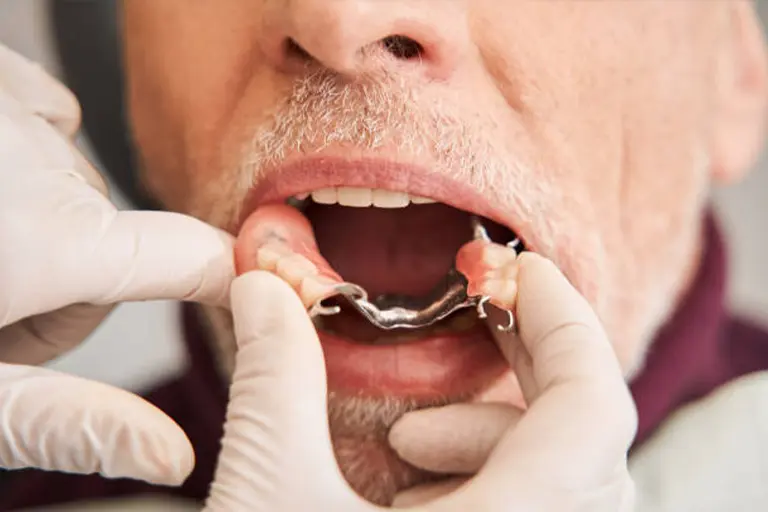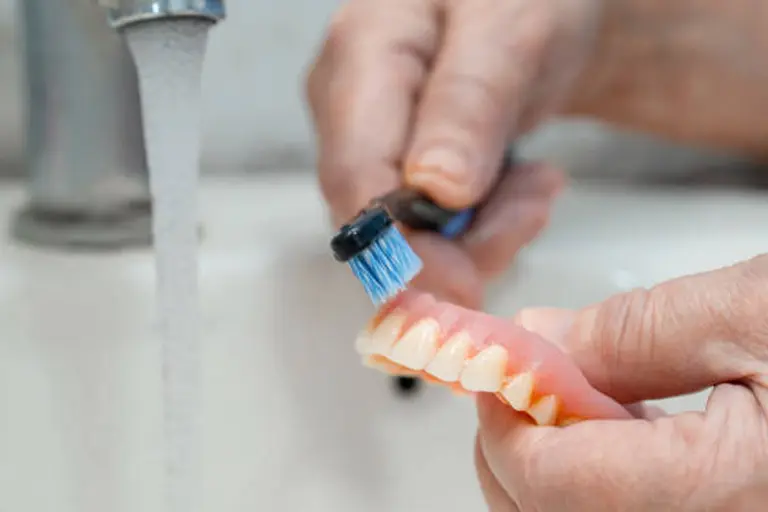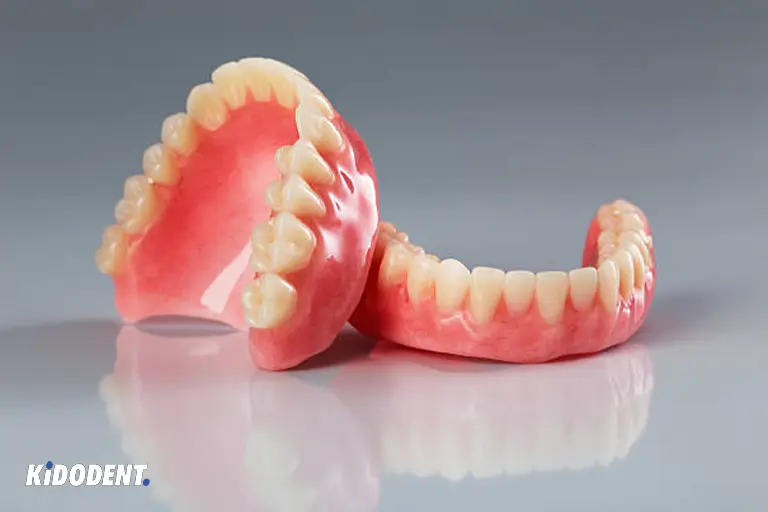What is denture stomatitis?
Denture stomatitis is an inflammatory oral condition caused by fungus or yeast (candida). Denture stomatitis is also called denture sore mouth due to red lesions that show up in the mouth. It is associated with wearing complete or partial dentures.
Denture stomatitis typically occurs among denture-wearers and it affects mostly the mucous surface of upper or maxillary soft tissues. Your oral soft tissues, where the denture surface is placed, and your palate appear red and inflamed. The primary causes of denture stomatitis are poor oral health and lack of denture hygiene or care.
Candida albicans fungus is the pathogen responsible for candida-induced denture stomatitis. Normally, candida species inhibit in oral cavity but does not miss any chance to cause harm if there is a good environment for them to breed. Denture stomatitis is likely if you continue on poor oral and denture hygiene habits, with no cleaning of deposits of plaque biofilm on your dentures and oral tissues and no daily removal of food debris.
Keep in mind that keeping a damp and moist environment underneath the denture without daily removal of dentures will create a favorable place for development of fungal and bacterial overgrowth. The same candida fungus will cause oral thrush even in people who are not wearing dentures.
You may not even realize that stomatitis is present occasionally since it is sometimes asymptomatic in some people. During oral examinations, but, your dentist will diagnose the condition, so you prevent it from going undetected.

What does denture stomatitis look like?
If you remove your dentures, the area that dentures rest looks red and inflamed. Generally, your palate, gum ridge (alveolar ridge) and any area under the dentures can be impacted by denture stomatitis. You may see fiery red skin in the form of just pinpoints of red congested patches or a reddening of skin of the entire area covered by dentures. Although denture stomatitis can be asymptomatic and show no symptoms, in most of the time, you may feel symptoms such as:
- Pain
- Bleeding and swelling
- Burning sensations in your mouth
- Tingling and itching
Who is likely to get Denture stomatitis?
Although 20 to 70 % of all denture wearers can be impacted by denture stomatitis, those who wear dentures without daily removal and routine cleaning of their prosthetic appliance are the highly affected people. The denture stomatitis is the common disease among both partial and complete denture wearers.
Anyone who is wearing their dentures continuously for long periods is at risk of denture stomatitis. Individuals who do not remove dentures overnight will put the greatest risk to their oral health. This is why dentists constantly recommend denture wearers to remove their removable dentures overnight.
Certain underlying health issues can also make the person susceptible to stomatitis. Common health issues include diabetes, immune system problems, salivary flow disorders, certain medications that cause dry mouth, and aging health problems.
What causes denture stomatitis?
We all have candida and hundreds of other species of microorganisms in our mouth. But if we overlook our routine oral health practices and daily denture cleaning tasks, we are prone to destructive damage by these intraoral species.
Candida are normal organisms found in the oral cavity and can stick to our oral mucous surface inside the mouth and on the surface of dentures. Candida or thrush can develop as a result of poor oral hygiene, infections, damage by ill-fitting dentures, xerostomia, systemic diseases, and other intraoral irritants. The buildup of plaque biofilm and calculus house species of bacteria and fungal biofilm in oral cavity.
Thus, if plaque is not removed and these conditions persist, gums and palate under your dentures will be targeted by these harmful fungal activities. The main causes of denture stomatitis are:
- Poor oral hygiene
- Poor denture cleaning
- Continuously wearing the dentures
- Excessive pressures and trauma by ill-fitting dentures to the soft tissues
- Nutritional deficiencies
- Xerostomia (dry mouth)
- Certain conditions and diseases like immunodeficiency problems, diabetes or aging conditions
- Allergic reactions
- Tobacco use
How is denture stomatitis treated?
- Oral and denture hygiene:
-
Since poor oral hygiene and bad denture care and habits are the sources of denture stomatitis, you should decrease the risks to a minimum. Start by overnight removal of dentures and removing dentures daily to clean and rinse with soap. Try soaking dentures for 30 minutes in denture cleanser. Clean your oral mucosa and any spot that is in direct contact with dentures. Your dentists may even plan a much more efficient plaque control method if the poor oral health persists.
- Changing your dentures:
-
You might require a new denture or readjustment with your current dentures if stomatitis is the result of your ill-fitting dentures.
- Antifungal therapy:
-
In serious form of denture stomatitis, your dentist decides on the elimination of overgrowth of candida fungus through antifungal therapy.
- Surgery:
-
Although surgery will rarely be used in denture stomatitis treatment, in severe cases and in patients with serious health issues, it can be used. Surgical removal of the infected mucous surface of the skin can be prescribed through such procedures like cryosurgery or CO2 laser operation.

How to prevent denture stomatitis?
The best and the simplest way to prevent denture stomatitis is to stick to your daily oral and denture hygiene routines. Also, have your dentures refit or remade if you have ill-fitting dentures, which causes injuries and damages.
To have fresh healthy gums and mouth for dentures to place, you should rinse and clean your oral soft tissues daily. Clean your gums, palate and generally your entire mouth after each denture removal. Use an antibacterial mouthwash or brush your gums and remaining teeth (in case of partial dentures) with a soft-bristled brush and toothpaste. Do not forget to clean off denture adhesives on your gums each time if you have used one.
For cleaning your dentures, use a denture brush or an electric brush and denture paste or liquid soap to get rid of food particles and deposits of plaque on your dentures. This is to curb and eliminate fungal and bacterial development on the surface of your dentures.
Do not forget to soak them in denture cleanser or a safe antimicrobial solution to loosen the adhered deposits and stained spots on your dentures. Then brush away the debris and rinse them under mild warm water. Avoid using hot water in any denture cleaning procedures because it causes dentures to change shape and warp.
Follow the manufacturer’s instruction on cleaning the item in order to prevent any damages to the product. You can see our post on how to care for your dentures for detailed denture care guidelines to prevent any denture stomatitis case.
